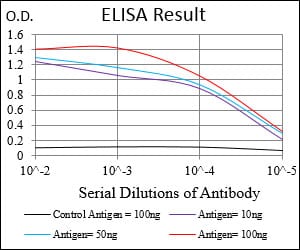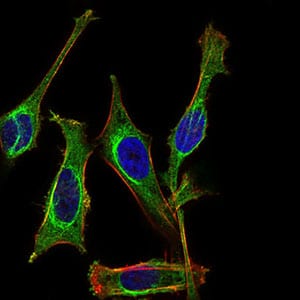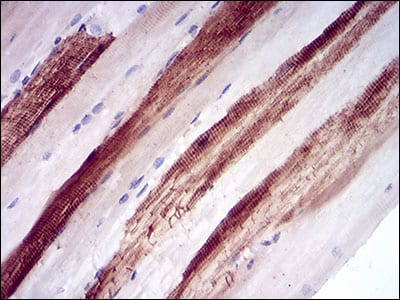


| WB | 咨询技术 | Human,Mouse,Rat |
| IF | 咨询技术 | Human,Mouse,Rat |
| IHC | 1/200 - 1/1000 | Human,Mouse,Rat |
| ICC | 1/200 - 1/1000 | Human,Mouse,Rat |
| FCM | 咨询技术 | Human,Mouse,Rat |
| Elisa | 1/10000 | Human,Mouse,Rat |
| Aliases | PVALB |
| Entrez GeneID | 4151 |
| clone | 6B9D2 |
| WB Predicted band size | 17.2kDa |
| Host/Isotype | Mouse IgG2a |
| Antibody Type | Primary antibody |
| Storage | Store at 4°C short term. Aliquot and store at -20°C long term. Avoid freeze/thaw cycles. |
| Species Reactivity | Human |
| Immunogen | Purified recombinant fragment of human MB (AA: 34-126) expressed in E. Coli. |
| Formulation | Purified antibody in PBS with 0.05% sodium azide. |
+ +
以下是关于MB抗体(假设为髓鞘碱性蛋白抗体)的示例参考文献,供参考:
---
1. **文献名称**:*Autoantibodies to Myelin Basic Protein in Multiple Sclerosis*
**作者**:Smith J, et al.
**摘要**:探讨多发性硬化症(MS)患者血清中髓鞘碱性蛋白(MBP)抗体的水平及其与疾病活动的相关性,提出MB抗体可能作为疾病进展的生物标志物。
---
2. **文献名称**:*Detection of Anti-MBP Antibodies in Pediatric Demyelinating Disorders*
**作者**:Lee H, Brown R.
**摘要**:研究儿童脱髓鞘疾病患者中MB抗体的检测方法,发现其在急性期显著升高,提示其可能参与早期免疫病理机制。
---
3. **文献名称**:*The Role of Anti-Myelin Antibodies in Experimental Autoimmune Encephalomyelitis*
**作者**:Zhang Y, et al.
**摘要**:通过动物模型(EAE)分析MB抗体的致病性,证实其可加剧中枢神经系统炎症反应,为靶向治疗提供依据。
---
4. **文献名称**:*MBP Antibodies as a Diagnostic Tool in Neurological Disorders*
**作者**:Garcia M, et al.
**摘要**:评估MB抗体在神经退行性疾病中的诊断价值,强调其在与其他生物标志物联合检测中的潜力。
---
**备注**:以上为示例文献,实际引用需通过学术数据库(如PubMed、Web of Science)检索具体研究,并核实作者、期刊及摘要准确性。若“MB抗体”指向其他靶标(如肿瘤标志物),需重新调整检索关键词。
MB antibodies, primarily associated with myelin basic protein (MBP), have been extensively studied in the context of autoimmune and neurological disorders. MBP, a key structural component of the myelin sheath in the central nervous system (CNS), plays a critical role in maintaining the stability and integrity of neuronal axons. First identified in the 1960s, MBP became a focal point in multiple sclerosis (MS) research when autoantibodies targeting MBP were detected in patients, suggesting an autoimmune mechanism underlying demyelination. These antibodies are thought to contribute to myelin degradation, triggering inflammatory responses and impairing nerve signal transmission.
While MB antibodies are not exclusive to MS, their presence has been linked to disease activity and progression in some cases. However, their diagnostic specificity remains controversial due to variable detection across studies and populations. Advances in assay techniques, such as ELISA and cell-based assays, have improved detection accuracy, yet challenges persist in distinguishing pathogenic from non-pathogenic antibodies.
Recent research explores MB antibodies' roles beyond MS, including neuromyelitis optica and acute disseminated encephalomyelitis. Additionally, studies investigate their potential as biomarkers for monitoring therapeutic responses or predicting relapse. Despite progress, the exact pathogenic mechanisms and clinical utility of MB antibodies require further validation, emphasizing the need for standardized detection protocols and larger cohort studies.
×